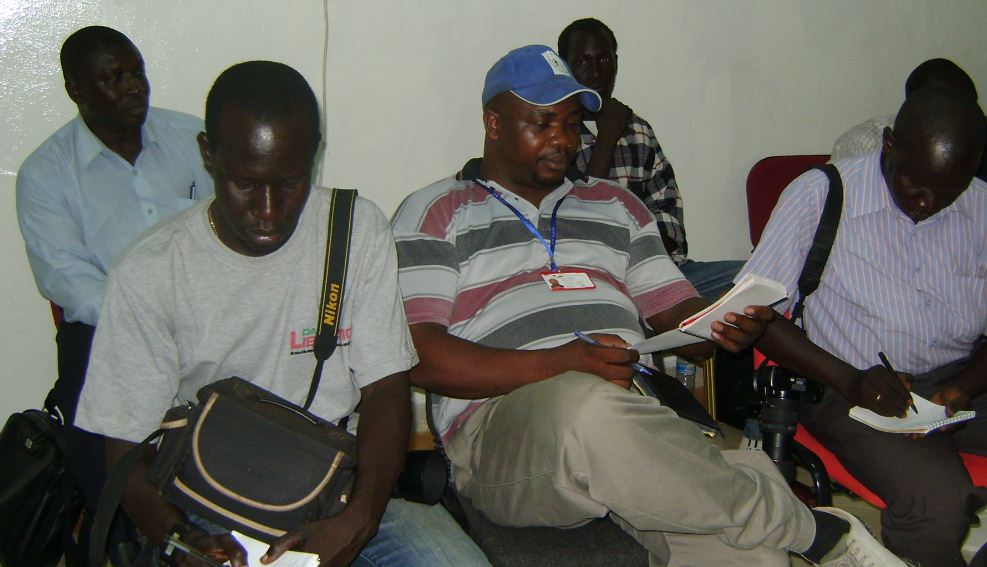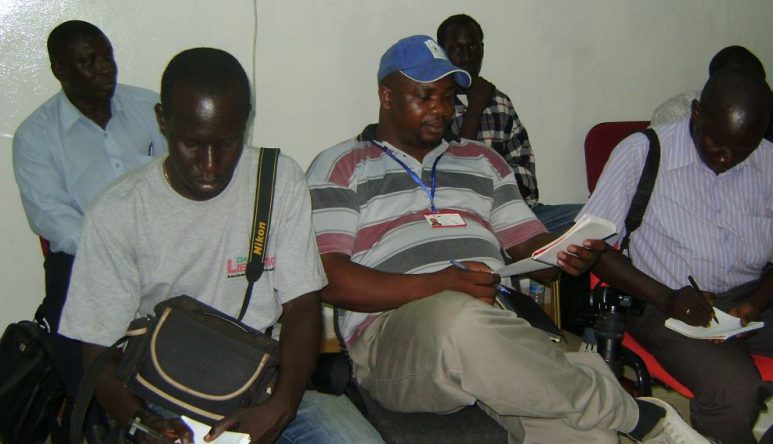By Paullina Poni
Journalists in South Sudan have resorted to self-censorship as a survival tactic to defy the odds arrayed against them in the troubled media industry. They have to think twice before covering issues such as those touching on matters of corruption, tribal conflict, politics and even security. In most cases journalists do not write openly on these topics because they think by doing so they may risk arrest or even lose their jobs, due to cases where whole media houses have been targeted and threatened with dire consequences.
Otieno Ogeda, a seasoned journalist from South Sudan, explains that self-censorship is the only way to go for journalists who want to survive without rubbing the government, security agents and even their bosses up the wrong way. He says that with all the threats from the government, lack of employment and the fear of losing their jobs, journalists know they have to take extra care before writing articles that may annoy the authorities.

“In South Sudan a journalist has to think twice before writing certain articles. Journalists are not always sure whether they would annoy their editors who must guard against the closure of their media house by the government,” asserts Ogeda.
The list of taboo subjects for the media is growing as journalists ponder what the future holds for them. Top on the list of untouchable areas for journalists in South Sudan include corruption in the government and human rights abuses. Reporting about the many tribal conflicts across the country is also regarded as unsafe because the government can view this as incitement. In addition, attacks against, or pressure put on, media houses by powerful individuals often go unreported because journalists writing or airing such stories know they are taking serious risks.
Ogeda says that some local journalists have only survived in the profession because they keenly gauge the contents of their news before it sees the light of the day, versus the expected reaction of the targeted audience and even those mentioned in the story.
“This is a country emerging from conflict and we have to admit that people are so traumatized, people are yet to understand the role of the media; it is only safe for any journalist to watch what he writes lest he falls on the wrong side of the law which is very not good for anyone”, Ogeda advises.
Of course, the problem is that journalists are not often clear what the law is when it comes to reporting because the long awaited Media Bill has still not been passed, and therefore most error on the side of caution which increases the amount of self-censorship. The adoption of the Media Bill will hopefully draw clear lines on what is acceptable and what is not, thus offering journalists some legal protection and reducing the need for self-censorship.
In some cases, of course, self-censorship is a good thing when done for the right reasons; when a journalist through awareness of their own biases or the sensitivity of a situation is circumspect about the stories they produce for the example. Mr George Garang, the Undersecretary at GoSS Ministry of Information and Broadcasting, admits that sometimes journalists must practice self-censorship. “The media should be guided by the principles of responsibility, honesty and accuracy. What we report should be balanced not to incite and cause problems,” he stated.
when a journalist through awareness of their own biases or the sensitivity of a situation is circumspect about the stories they produce for the example. Mr George Garang, the Undersecretary at GoSS Ministry of Information and Broadcasting, admits that sometimes journalists must practice self-censorship. “The media should be guided by the principles of responsibility, honesty and accuracy. What we report should be balanced not to incite and cause problems,” he stated.
However, there are many times when self-censorship is conducted for the wrong reasons, and keeps important information from the public or feeds them inaccurate information, which is obviously not in the interest of society in general. “I have seen situations where politicians own media houses and have vested interests in particular issues; they either bribe the media or even demand to know the news content before publications see the light of day. In such cases journalists censor they stories before showing it to their bosses,” Ogeda reveals further.
33 year old female journalist Janet Kiden says that most journalists do not write critically because they do not have enough support from their own editors, who denounce them whenever they run into trouble with quoted sources. Kiden says that in such situations she would not want to put her job on the line as she, after all, understands the repercussions, which can include the risk of being fired and detention.
“I know of cases where a local journalist was threatened with dire consequences over reports that appeared in his weekly column which suggested that certain powerful persons in the government were involved in corruption. In fact it was the named Minister who ordered the arrest of the journalist. Instead they asked him to tone down his criticism of the young government,” asserted Kiden.
Charles Yuggu is a Juba based freelance journalist and says that he wouldn’t take up any assignment that involves the interviewing of security personnel, particularly the police. “You see, that time The People’s Voice asked me to go and source for a story on the establishment of gender reporting desks at police stations, I declined because I knew the consequences,” admits the 27 year old reporter. Adding, “those people [read police] are not friendly; instead they would even brand me a spy and lock me up. I just hate covering anything that involves the police, because they do not even open up to the media and might even decide to arrest you on very flimsy grounds.”
And then, of course, there are a journalist’s own prejudices and biases, related perhaps to tribal loyalties, or their religious belief, which can affect what they do and do not write about. This is particularly a problem when the media is at an early stage in its development, as it is in South Sudan, and when there is little formal education or training available for journalists. Juba University does not even have a proper journalism course for example.
Yuggu further discloses that he would also not report on certain aspects of his own community’s customary laws, however out-dated and bad they can sometimes be for certain members of the community. “My community is Kuku and we have lots of things such as sex and witch craft that are considered taboos to be discussed in public. I would personally not feel comfortable exposing anything about the Kuku people, which I know very well will obviously cause me trouble. In fact I will be viewed as a traitor by my village mates,” Yuggu says.
With the ghost of unofficial censorship imposed by the authorities continuing to haunt the fragile media sector, as well as the self-censorship practiced by journalists themselves, the future of journalism, and therefore, the future of public information in South Sudan isn’t looking bright. In fact, it seems that as journalists begin to become more aware of unspoken red lines; self-censorship, worryingly, may be a major reason for the decline in the number of cases of attacks on the press.

